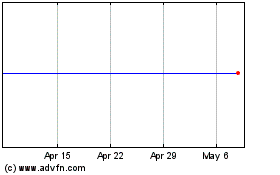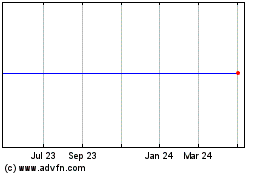By Eric Sylvers
Fiat Chrysler Automobiles NV is banking on a planned $50 billion
merger with Peugeot maker PSA Group to help it catch up with rival
car companies. But in the year or so until the deal gets done, the
Italian-American car maker risks falling farther behind.
The manufacturer of Chrysler cars and Ram trucks faces falling
sales volumes around the world, including a small decline in North
America, where it generates more than 90% of profit. Once-steady
cash cow Jeep is stumbling, luxury brand Maserati is cratering, the
umpteenth attempt to relaunch Alfa Romeo has fallen flat and Fiat
sold 7% fewer cars in Europe last year compared with 2018. And the
cost of being an electric-car laggard is rising.
When the merger is complete, PSA CEO Carlos Tavares will take
the same role at the new group. His success with the Peugeot and
Opel brands earned him a reputation as a turnaround expert and many
analysts are betting he can fill that role once he gets his hands
on Fiat Chrysler.
The history of auto industry megamergers is checkered and Mr.
Tavares must solve a host of issues, including excess capacity in
Europe and low exposure to Asia. Yet analysts have so far given him
the benefit of the doubt.
Beyond Fiat Chrysler's highly profitable North American
business, "most of the rest of it is a headache," Bernstein analyst
Max Warburton wrote after the company released third-quarter
results. "You know it, I know it and Tavares knows it. But Tavares
has a plan."
Yet Fiat Chrysler has to go it alone for the next 12 to 15
months, the time frame given for completing the deal when terms
were announced in December. And if things deteriorate further this
year, Mr. Tavares could find himself facing a more difficult
challenge.
Fiat Chrysler declined to comment or make Chief Executive Mike
Manley available for an interview. On an earnings call in October
with analysts, Mr. Manley said steps were being taken to improve
profitability.
PSA declined to comment or make Mr. Tavares available.
Fiat Chrysler is slated to report fourth-quarter results on Feb.
6. Through the first nine months of 2019, net profit from
continuing operations fell 48% to EUR1.1 billion ($1.2 billion).
Adjusted operating profit, which strips out one-time items, fell
7.2%, to EUR4.6 billion.
To be sure, Fiat Chrysler continues to churn out robust profit
in North America, where its 10.6% operating profit margin in the
third quarter beat Ford Motor Co. by 2 percentage points and was
within striking distance of General Motors Co. Sales of high-margin
Ram trucks rose 18% in the region in 2019, the 10th straight yearly
increase.
Brisk sales of Jeep sport-utility vehicles helped sustain the
company for the past five years, but volume fell 5% in 2019 in the
U.S., the brand's most important market. Fiat Chrysler's Belvidere
Assembly Plant near Chicago is currently in a two-week shutdown to
work through excess inventory of the Jeep Cherokee. Last year, Jeep
volume also retreated slightly in Europe, the first decline since
2013.
Meanwhile, Maserati suffers from a limited offering of models
and a dependence on sedans at a time when consumers are
increasingly turning to SUVs. The brand lost about EUR160 million
through the first nine months of last year, as volume plunged more
than 40%.
Alfa Romeo has repeatedly missed volume targets despite Fiat
Chrysler's investments to boost the brand's appeal through new
models and marketing. Sergio Marchionne, Fiat Chrysler's longtime
CEO until he died in 2018, set a target to sell 400,000 Alfa Romeos
in 2018, but about 170,000 were actually sold that year.
Fiat Chrysler in recent years has skimped on investing in
electric vehicles. The shortfall will be partially addressed with
the merger, as PSA has developed electric-vehicle technology.
Fiat Chrysler is meeting European Union emissions rules in part
through a deal that pools its vehicles' carbon-dioxide emissions
with Tesla Inc.'s. While Fiat Chrysler hasn't said how much it is
paying Tesla, investment bank Jefferies estimates it at between
EUR600 million and EUR700 million for this year.
All the challenges could make it difficult for Fiat Chrysler to
meet its target for adjusted operating profit this year of more
than EUR7 billion, which Jefferies has called ambitious. That
target, given in October, was a big step back from the goal it set
in mid-2018 for this year, as much as EUR10.4 billion.
Car sales softened in the U.S. in 2019. They have also declined
in China the past two years, making it harder for Fiat Chrysler to
make headway in the world's largest auto market, where it once had
big ambitions for Jeep. Europe's already-tightened emissions
requirements are also likely to become even more stringent as the
EU introduces a new climate law by March.
The car industry is entering "a multiyear profit desert that is
arriving just when the sector seems to already be in a cyclical
recession," says Dario Duse, a managing partner at AlixPartners, a
consulting firm that specializes in corporate turnarounds.
For now, many analysts are betting Mr. Tavares will be able to
fix Fiat Chrysler, whose shareholders will receive a EUR5.5 billion
special dividend before the merger closes, opening the executive
opening the executive to criticism over the terms of the deal.
"Has the world's most frugal auto executive ever overpaid for
anything?" wrote Bernstein's Mr. Warburton. "If Tavares has agreed
to merger terms that look to value FCA more highly than PSA...maybe
there is a reason?"
Write to Eric Sylvers at eric.sylvers@wsj.com
(END) Dow Jones Newswires
January 26, 2020 08:14 ET (13:14 GMT)
Copyright (c) 2020 Dow Jones & Company, Inc.
Fiat Chrysler Automobile... (NYSE:FCAU)
Historical Stock Chart
From Mar 2024 to Apr 2024

Fiat Chrysler Automobile... (NYSE:FCAU)
Historical Stock Chart
From Apr 2023 to Apr 2024
